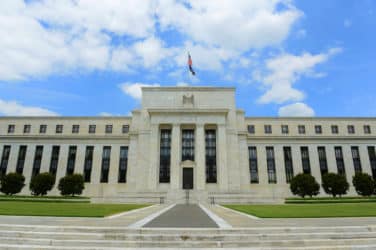With the jobs report out of the way and failing to spark significant up or downside movement, equities traders continue to look ahead to the upcoming FOMC meeting.
Last week saw trading remain in a post-holiday slumber of sorts as trading on U.S. equity exchanges fell again as traders were slow to return to their desks and economic data failed to generate interest. Trading levels averaged 7.05 billion shares per day for the week ended December 2, according to Bats Global Markets data. That’s compared to an average of 7.14 billion shares in the week ending November 23.
According to William Mingione, Managing Director and Head of Equities at Drexel Hamilton in New York, there continues to be a shift in asset classes thanks to the “Trump Effect”, as technology continues to be a drag and financials and oil sectors outperforming.

William Mingione, Drexel Hamilton
“The S&P and Nasdaq are on track to snap 3 and 4 week winning streaks, as the massive post-election rally slowed down,” Mingione said. He added that the small cap Russell 2000 index, which has outperformed the large indexes lately, was also on pace for a negative week.
Looking back, oil was front and center this week after OPEC finally reached a deal and oil was up more than 10%.
Last week’s marquee economic report, the November employment report, failed to move the market significantly, one trader said, as the data reported the U.S. economy added 178,000 jobs in November, and the unemployment rate fell to 4.6 percent. This was pretty much in line with what traders were expecting – as most forecasts were pegged at 175,00 new jobs.
“The report was not too hot and not too off,” said a New York trader. “It really doesn’t do much to change the Fed’s mind – there will be a hike this week but further hikes look a little less likely unless the economy really picks up steam or inflation rears its ugly head.”
Drexel’s Mingione concurred, adding that the headline numbers will have no bearing on December rate hike, however it could have implications for a more rapid pace of rate hikes next year.
Looking ahead, Mingione said the outcome on this past Sunday’s Italian referendum could move markets. Italian Prime Minister Matteo Renzi wants to change the constitution so that the executive branch needs approval only from parliament’s lower house to pass laws. He explained that Renzi thinks this change is so important to turn around Italy’s lackluster economy that he has vowed to resign if the referendum is defeated.
“A ‘No” vote could have similar ripple effects as Brexit, however Italy’s economy is not as big, so any sell off would be shallow,” Mingione said.
Another trader in the Midwest agreed, telling Markets Media that the jobs data was the last major and significant economic indicator before the Federal Open Market Committee meets for two days next week to decide if it will raise short-term interest rates.
The market is assigning about a 93 percent chance that the Fed will raise rates by 25 basis points.
In related market news, The Securities and Exchange Commission today announced that the Commission voted to renew the Equity Market Structure Advisory Committee’s charter until August 2017 with the current membership. The committee’s charter was originally scheduled to expire in February 2017.
The committee provides a formal mechanism through which the Commission can receive advice and recommendations specifically related to equity market structure issues. The committee has met seven times since it was established in February 2015.
“The Equity Market Structure Advisory Committee’s renewal enables the next Chair and the next Commission to benefit seamlessly from this vital resource for our ongoing assessment of equity market structure issues and potential enhancements,” said SEC Chair Mary Jo White.
Also, market consultancy Greenwich Associates recently found that despite myriad market structure issues – many of which have recently made headlines – little, if anything, has been done to address and/or fix them. In a new report, buysiders give their two cents on such issues as maker/taker pricing, co-location, trade-at rule, the Tick Size Pilot Program, impact of MiFID II in the U.S., and dark pool caps.
The report, “Investors’ Take on Market Structure Issues,” presents the results of interviews with 55 institutional buy-side equity traders at pension funds, defined contribution type plans and other managers.
One of the standout findings, Greenwich reports, is that traders have a highly pessimistic view of the recently launched Tick-Size pilot, with only 9% of buy-side traders believing it will improve liquidity in small cap securities. In addition, these traders by a wide margin thought it more likely that the pilot program will increase, rather than decrease, execution costs.
Also last week, Credit Suisse’s global equity strategy team released a note which stated the firm expects to see the S&P 500 rising 7 percent to 2,350 by mid 2017 on the Donald Trump Administration takes the economic reins. However, the bulge firm sees a mid– 2017 pull back from the highs with the S&P settling around 2300.
Lastly, exchange operator IEX has filed with the Securities and Exchange Commission an application to upgrade its Primary Peg order type.
The new upgraded Primary Peg is designed to protect orders when trading at the inside quote, according to the filing with the SEC.
Pending SEC approval, IEX’s upgraded Primary Peg is a non-displayed order type that is pegged 1 minimum price-variant (MPV) outside the primary quote (below the NBB for buys; above the NBO for sells) and can “step up” to trade at the primary quote except during periods of quote instability, as determined by IEX’s “crumbling quote” indicator.
The crumbling quote indicator is basically a signal IEX developed that looks for “highly predictable” changes in the NBBO. In essence, a ”crumbling quote” is a quote change that is happening very inefficiently, slowly and is derived from market data.
This Week’s U.S. Economic Indicators of Interest:
| Monday | William Dudley Speaks
Charles Evans Speaks
|
| Tuesday | Redbook Retail Sales
International Trade Factory Orders |
| Wednesday | Consumer Credit |
| Thursday | Jobless Claims |
| Friday | Consumer Sentiment
Wholesale Trade |
More on Trading
- Blockchain Leaps Forward
- Shenzhen-Hong Kong a “Game Changer” for ETFs
- Buy Side Remains Skeptical on Market Structure





